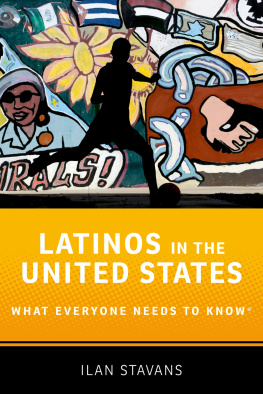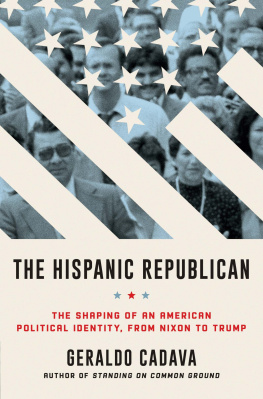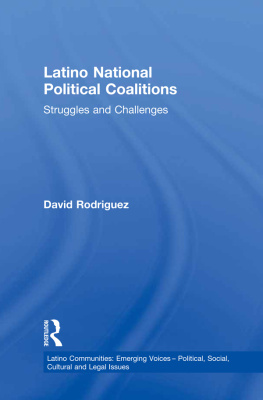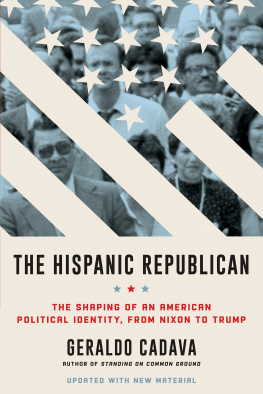Felix G Rivera - Latino/Hispanic Liaisons and Visions for Human Behavior in the Social Environment
Here you can read online Felix G Rivera - Latino/Hispanic Liaisons and Visions for Human Behavior in the Social Environment full text of the book (entire story) in english for free. Download pdf and epub, get meaning, cover and reviews about this ebook. year: 2002, publisher: Taylor & Francis, genre: Home and family. Description of the work, (preface) as well as reviews are available. Best literature library LitArk.com created for fans of good reading and offers a wide selection of genres:
Romance novel
Science fiction
Adventure
Detective
Science
History
Home and family
Prose
Art
Politics
Computer
Non-fiction
Religion
Business
Children
Humor
Choose a favorite category and find really read worthwhile books. Enjoy immersion in the world of imagination, feel the emotions of the characters or learn something new for yourself, make an fascinating discovery.

- Book:Latino/Hispanic Liaisons and Visions for Human Behavior in the Social Environment
- Author:
- Publisher:Taylor & Francis
- Genre:
- Year:2002
- Rating:3 / 5
- Favourites:Add to favourites
- Your mark:
- 60
- 1
- 2
- 3
- 4
- 5
Latino/Hispanic Liaisons and Visions for Human Behavior in the Social Environment: summary, description and annotation
We offer to read an annotation, description, summary or preface (depends on what the author of the book "Latino/Hispanic Liaisons and Visions for Human Behavior in the Social Environment" wrote himself). If you haven't found the necessary information about the book — write in the comments, we will try to find it.
Felix G Rivera: author's other books
Who wrote Latino/Hispanic Liaisons and Visions for Human Behavior in the Social Environment? Find out the surname, the name of the author of the book and a list of all author's works by series.
Latino/Hispanic Liaisons and Visions for Human Behavior in the Social Environment — read online for free the complete book (whole text) full work
Below is the text of the book, divided by pages. System saving the place of the last page read, allows you to conveniently read the book "Latino/Hispanic Liaisons and Visions for Human Behavior in the Social Environment" online for free, without having to search again every time where you left off. Put a bookmark, and you can go to the page where you finished reading at any time.
Font size:
Interval:
Bookmark:
Felix G. Rivera, PhD
Editors

Street, Binghamton, NY 13904-1580 USA.
| Routledge Taylor & Francis Group 711 Third Avenue New York, NY 10017 | Routledge Taylor & Francis Group 2 Park Square, Milton Park Abingdon, Oxon OX14 4RN |
p. cm.
Latino/Hispanic liaisons and visions for human behavior in the social environment has been
co-published simultaneously as Journal of human behavior in the social environment, vol. 5, nos. 3/4, 2002.
Includes bibliographical references and index.
ISBN 0-7890-1656-7 (alk. paper)ISBN 0-7890-1657-5 (pbk: alk. paper)
1. Hispanic AmericansSocial conditions. I. Torres, Jos B. II. Rivera, Felix G. III.
Journal of human behavior in the social environment.
E184.S75 L3555 2002
| 305.868073dc21 | 2002017185 |
Felix G. Rivera
Marsha Mailick Seltzer
Marty Wyngaarden Krauss
Mark Rubert
Jos Szapocznik
Esterla Barreto
John Michael Daley
Keith M. Kilty
Stephen N. Haymes
Font size:
Interval:
Bookmark:
Similar books «Latino/Hispanic Liaisons and Visions for Human Behavior in the Social Environment»
Look at similar books to Latino/Hispanic Liaisons and Visions for Human Behavior in the Social Environment. We have selected literature similar in name and meaning in the hope of providing readers with more options to find new, interesting, not yet read works.
Discussion, reviews of the book Latino/Hispanic Liaisons and Visions for Human Behavior in the Social Environment and just readers' own opinions. Leave your comments, write what you think about the work, its meaning or the main characters. Specify what exactly you liked and what you didn't like, and why you think so.







